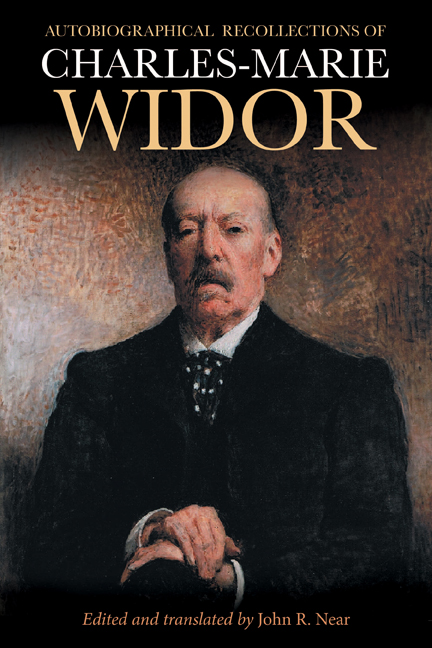Book contents
- Frontmatter
- Contents
- List of Illustrations
- Foreword
- Preface
- Acknowledgments
- Introduction: Tribute to Charles-Marie Widor
- Part One Studies, Early Performances, and Aristide Cavaillé-Coll (1844–69)
- Part Two La Belle Époque: The Franco-Prussian War to The Great War (1870–1914)
- Part Three The Great War and Important Initiatives (1914–37)
- Appendix 1 Birth record of Charles-Marie Widor, 1844
- Appendix 2 Widor’s Diplôme de Bachelier ès Lettres, 1863
- Appendix 3 Widor’s letter of appreciation to Jacques Lemmens, 1863
- Appendix 4 Brussels Ducal Palace organ specification, 1861
- Appendix 5 Widor’s certificate for Chevalier de l’Ordre du Christ, 1866
- Appendix 6 “To Budapest,” 1893
- Appendix 7 Widor’s travels to Russia and his 1903 passport
- Appendix 8 Widor’s list of his works in 1894
- Appendix 9 The Paris Conservatory organs, 1872
- Appendix 10 Chronique [Widor’s appeal for an organ hall at the Paris Conservatory, 1895]
- Appendix 11 Widor’s certificate for the Académie Royale, Brussels, 1908
- Appendix 12 “Debussy & Rodin,” 1927
- Appendix 13 The American Conservatory organ, Fontainebleau, 1925
- Appendix 14 Letters concerning the Trocadéro organ restoration, 1926
- Notes
- Bibliography
- Index
- Eastman Studies in Music
3 - 1865: The Porto Exposition and Ouverture portugaise
Published online by Cambridge University Press: 09 May 2024
- Frontmatter
- Contents
- List of Illustrations
- Foreword
- Preface
- Acknowledgments
- Introduction: Tribute to Charles-Marie Widor
- Part One Studies, Early Performances, and Aristide Cavaillé-Coll (1844–69)
- Part Two La Belle Époque: The Franco-Prussian War to The Great War (1870–1914)
- Part Three The Great War and Important Initiatives (1914–37)
- Appendix 1 Birth record of Charles-Marie Widor, 1844
- Appendix 2 Widor’s Diplôme de Bachelier ès Lettres, 1863
- Appendix 3 Widor’s letter of appreciation to Jacques Lemmens, 1863
- Appendix 4 Brussels Ducal Palace organ specification, 1861
- Appendix 5 Widor’s certificate for Chevalier de l’Ordre du Christ, 1866
- Appendix 6 “To Budapest,” 1893
- Appendix 7 Widor’s travels to Russia and his 1903 passport
- Appendix 8 Widor’s list of his works in 1894
- Appendix 9 The Paris Conservatory organs, 1872
- Appendix 10 Chronique [Widor’s appeal for an organ hall at the Paris Conservatory, 1895]
- Appendix 11 Widor’s certificate for the Académie Royale, Brussels, 1908
- Appendix 12 “Debussy & Rodin,” 1927
- Appendix 13 The American Conservatory organ, Fontainebleau, 1925
- Appendix 14 Letters concerning the Trocadéro organ restoration, 1926
- Notes
- Bibliography
- Index
- Eastman Studies in Music
Summary
In 1865, the city of Porto opened an Exposition for which a large concert hall was provided. An English organbuilder had been commissioned to build an organ for it. Cavaillé-Coll was asked if he had an organist available to stay in Porto for four or five months to play the organ publicly every day from noon to one o’clock and on Sundays and holidays in open performances.
Cavaillé advised me to give way to the temptation offered by this opportunity, and I accepted, delighted to see that country and to live under such a sky. So, I played every day, and soon I was happy to notice that a small group of enthusiasts, including a certain number of English ladies, came daily to listen to me, even with such diligence that I became somewhat annoyed. I was obliged to vary my programs, so I invented some works, attributing them to this or that composer. I improvised, but let me confess here my embarrassment when by chance one of these works, having pleased one of my female listeners, was requested again by her a week later. Has my deception ever been discovered? I don't think so, but I still feel sincere remorse for it today.
My sojourn in Porto brought me another artistic benefit: that of hearing my music performed by an orchestra for the first time. For the end of the Exposition, I was asked to compose a grand overture for orchestra and organ. I wrote a very plain work, according to my ability. Although it was well received, I did justice to it a few years later by destroying it.
At the same time, summoned by the Exposition, I found in Porto an excellent flutist, Dupuis; an excellent Brazilian pianist, Arthur Napoléon [Napoleão dos Santos]—a former student of the Paris Conservatory, who has since died in Rio; and a consummate cellist, Carlo Casella. I wrote a little Sérénade for them that they premiered and that has been played everywhere ever since.
My sojourn in Porto gave me a certain notoriety. Before my departure, King Luís paid me the honor of giving me the Portuguese decoration of the Order of Christ.
- Type
- Chapter
- Information
- Publisher: Boydell & BrewerPrint publication year: 2024

